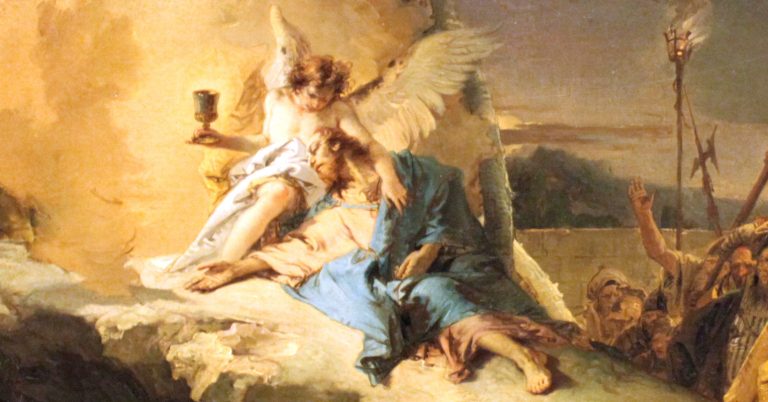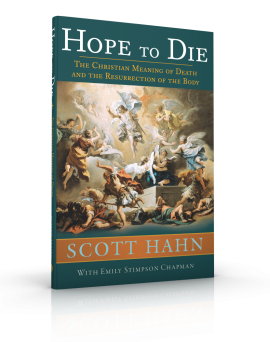By Andrew Willard Jones
Dr. Andrew Jones holds a PhD in Medieval History from Saint Louis University and is an expert on the Church of the High Middle Ages. He is the author of Before Church and State: A Study of Social Order in the Sacramental Kingdom of St. Louis IX and the pioneer of the Formed In Christ series of faith formation texts, as well as the author of several books in this series.

Sometimes, the most basic truth of Christianity is too much to get our minds around: God became our brother. That’s an astounding thing. No other religion makes this claim. In Greek and Roman mythology, the gods came down to earth to meddle and to frustrate humanity—not to become human. In other major religions, such as Islam, God is so far above and beyond the world that the idea of God becoming man is inconceivable. Only in Christianity does God, as part of the economy of salvation, take on our human nature and become man.
This was such a challenging idea that it took several hundred years for the Church to learn how to articulate it properly. The Incarnation is a great mystery. It also is the very center of the Christian understanding of all reality. In the Incarnation, God and man, heaven and earth, come together. It is the event that gives all other events meaning. For this reason, it was extremely important that the Church get its articulation of that mystery right and be able to precisely say that the eternal God became totally and completely a man without sacrificing any of his divinity; that the man Jesus remained totally God.
When we understand that, it makes his invitation to us all the more remarkable: the man who was God invites us to be his part of his family, that is to say, to become the sons and daughters of God the Father. This is salvation.
What he was, he remained and what he was not, he assumed” [LH, 1 January, Antiphon for Morning Prayer; cf. St. Leo the Great, Sermo in nat. Dom. 1, 2; PL 54, 191–192], sings the Roman Liturgy. And the liturgy of St. John Chrysostom proclaims and sings: “O only-begotten Son and Word of God, immortal being, you who deigned for our salvation to become incarnate of the holy Mother of God and ever-virgin Mary, you who without change became man and were crucified, O Christ our God, you who by your death have crushed death, you who are one of the Holy Trinity, glorified with the Father and the Holy Spirit, save us! [Liturgy of St. John Chrysostom, Troparion “O monogenes.”]. (CCC 469)
While Jesus remained who he was from all eternity, the divine Son of God, in time and history he was “incarnate of the virgin Mary” (Nicene Creed). This means he took on our human nature and lived an entirely human life:
For by His incarnation the Son of God has united Himself in some fashion with every man. He worked with human hands, He thought with a human mind, acted by human choice and loved with a human heart. Born of the Virgin Mary, He has truly been made one of us, like us in all things except sin. (Gaudiem et spes)
When we say Jesus lived an entirely human life this is saying that Jesus is like us “in all things but sin” (Heb 4:15). He demonstrated this humanity in every aspect of his earthly life and had many common human experiences.
Jesus even experienced the emotions of sorrow and distress, particularly the night before his Crucifixion. During the Agony in the Garden, he contemplated the tortuous death that he was about to experience and felt deeply troubled, so much so that he sweated drops of blood. While Jesus’ will never deviated from the will of God, that doesn’t mean that he wouldn’t have liked to avoid the physical pain that awaited him. He knew what was coming, and it grieved his heart.
Even more than the physical suffering, Jesus suffered when his closest friends let him down. During his Agony in the Garden, Jesus grew frustrated when Peter, John, and James couldn’t manage to stay awake with him. Then, one of his closest followers, one of the Twelve Apostles, Judas, betrayed him outright, arriving at the garden at the head of a mob. When Jesus referred to Judas as “friend” and asked him what he was doing (Matt 26:47–51), can we not hear the sadness in his voice? That same night, as Jesus was being mocked and beaten, St. Peter denied even knowing him, not once but three times. At the third denial, “the Lord turned and looked at Peter” (Luke 22:61). This must have been a moment of extreme sorrow for the Lord, one to which, unfortunately, so many of us can relate.
Death and sickness are a constant of human life, and Jesus didn’t avoid them either. In fact, he spent much of his ministry healing the sick and helping outcasts (see Matt 8:13, Luke 14:4ff., John 4:47ff., Luke 5:12ff.). In doing so, he personified compassion. The word “compassion” literally means “to suffer with,” and this is just what Jesus did. When he saw those who were hurting, he hurt with them. This is the nature of love. When you love someone, their joy is your joy, and their pain is your pain. God loves us completely. He feels our pain in a more direct and real way than even we do. Jesus, in the Incarnation, shows us this is true. He healed people, he helped them, and ultimately he went to the Cross and died for them. That death was both excruciatingly painful and humiliating. Because of it, not one of us, when we’re hurting, can say, “God doesn’t know what I’m going through!” He does. He has been there. And he remains ever ready to help us, heal us, and carry us as we carry our cross.
You Might Also Like
In Hope to Die: The Christian Meaning of Death and the Resurrection of the Body, Scott Hahn explores the significance of death and burial from a Catholic perspective. The promise of the bodily resurrection brings into focus the need for the dignified care of our bodies at the hour of death. Unpacking both Scripture and Catholic teaching, Hope to Die reminds us that we are destined for glorification on the last day.
